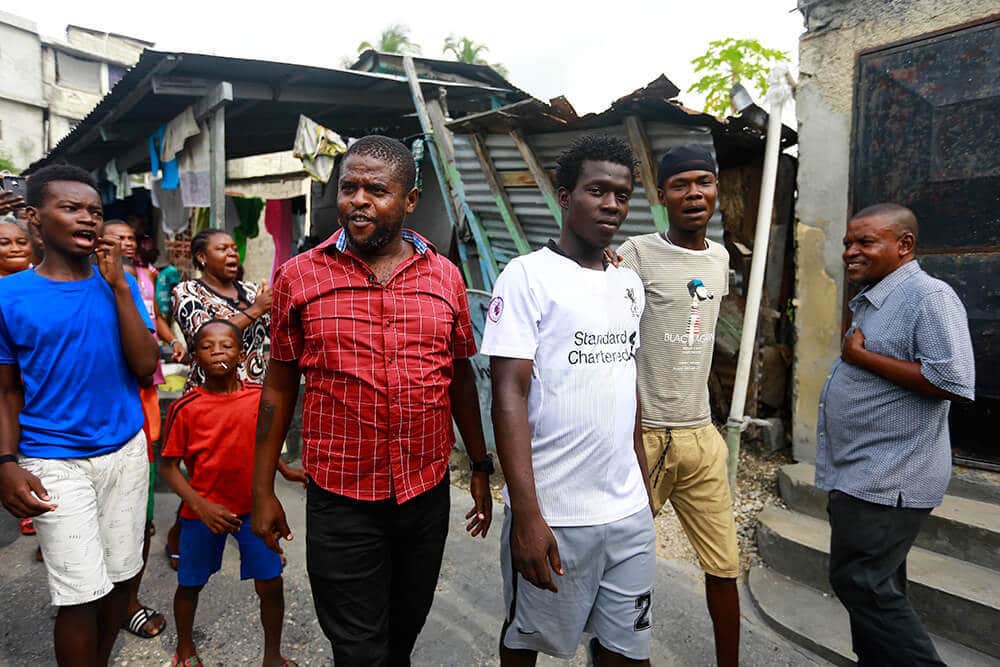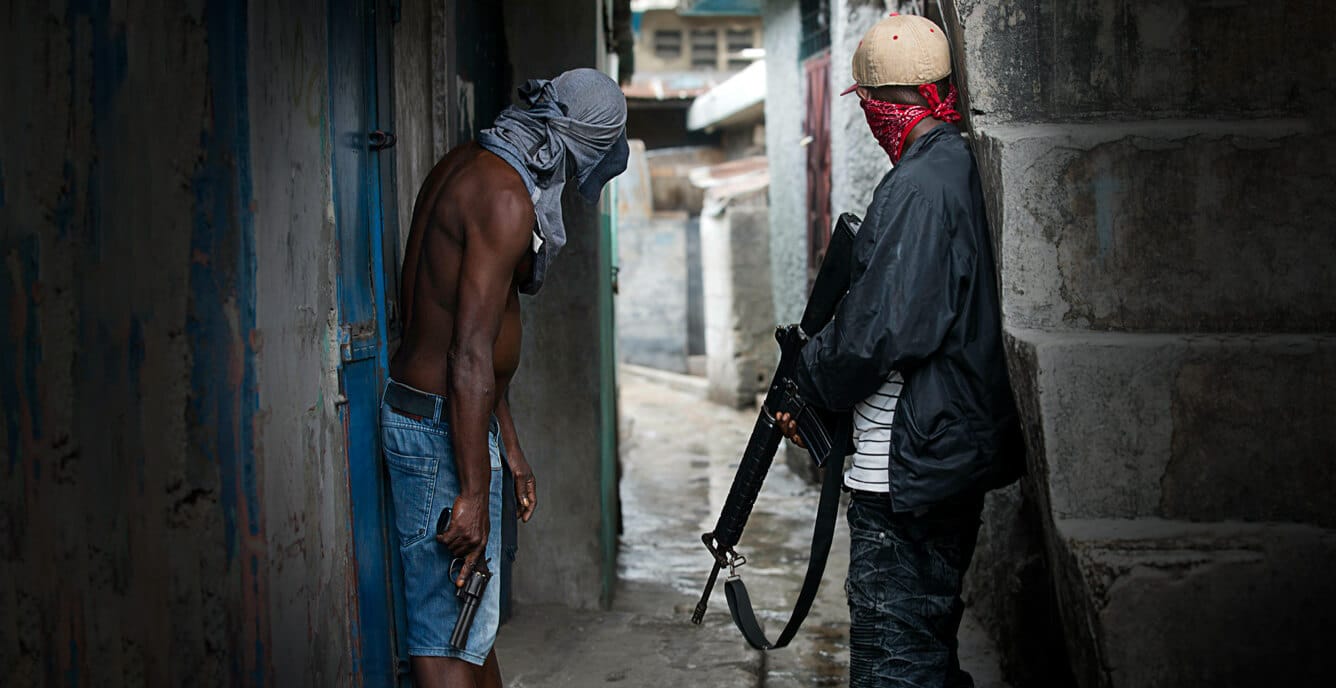The architect of a new gang alliance in Haiti has quite a reputation for human rights abuses.
Jimmy Chérizier, alias “Barbecue,” was first implicated in a massacre during his time as a police officer in the Caribbean nation in November 2017. What began as an anti-gang operation turned into the extrajudicial execution of at least 14 innocent civilians in the Grand Ravine neighborhood of the capital Port-au-Prince.
A year later, over a four-day stretch in November 2018, Chérizier was allegedly involved in murdering as many as 71 individuals in what became known as the La Saline massacre, the worst to rock Haiti in more than a decade.
In November 2019, a United Nations report named him in yet more human rights abuses in the Bel-Air neighborhood.
Now, after being fired from the police force in December 2018 and eluding a warrant for his arrest, Chérizier has emerged as the mastermind of the “G9 an Fanmi,” (G9 and Family), an alliance brokered in June between at least nine gangs in Port-au-Prince.
SEE ALSO: Coverage of Haiti
The G9 alliance has reportedly benefited from strong ties to the government of President Jovenel Moïse. The gang leaders are seemingly free from persecution so long as they help keep the peace in the neighborhoods they control. In exchange, Moïse’s government has found in them loyal foot soldiers quelling insecurity, stamping out opposition voices and shoring up political support across the capital.
This is crucial for Moïse, who has faced constant protests demanding his resignation by Haitians who blame him for the country’s dire economic crisis, rampant corruption, a gasoline shortage and rising violence — though Haiti is not an overly violent country, with a homicide rate of just over 9 per 100,000 citizens in 2019.
Meanwhile, the government is using the gangs to repress the opposition while parliamentary elections have been postponed indefinitely.

Chérizier Amasses Power
Chérizier has emerged as the latest, and arguably one of the most influential, gang leaders tasked with enforcing the state-sponsored alliance. But the power he has amassed as part of the G9 is unusual, even for Haiti’s long history of backroom deals between such groups and political leaders.
On May 23, Chérizier and allied gang leaders allegedly close to the government held a “preparatory meeting” to “organize simultaneous attacks” as a show of force across several Port-au-Prince neighborhoods, according to a report by Haiti’s National Human Rights Defense Network (Réseau National de Défense des Droits de l’Homme — RNDDH).
In the days that followed, between May 24 and 27, the report details how criminal gangs brought together by Chérizier attacked the communities of Pont-Rouge — long known for anti-government protests — Chancerelles, La Saline, Tokyo and Fort-Dimanche in a bid to expand their control. They set fire to scores of houses, burning and shooting between six and at least 34 individuals to death with the support of the national police.
On May 28, US Representative Maxine Waters denounced the atrocity, urging that these “brutal and unconscionable acts of politically motivated violence … stop once and for all.”
This fell on deaf ears.
On June 10, Chérizier, dressed in a powder blue suit with a pink shirt, announced the creation of the G9 alliance.
The RNDDH report and another from the watchdog group Fondasyon Je Klere (FJKL) allege that President Moïse has given gangs in the G9 alliance resources and room to operate in order to prevent the return of former president Michel Martelly (2011-2016) to power.
In fact, Chérizier personally has the ear of high-ranking government officials and has allegedly even received bribes from them, according to RNDDH Executive Director Pierre Espérance. In testimony given to the US Congress in December 2019, Espérance explained how the gangs “regularly receive money and automatic firearms [from executive and legislative powers], and they never run out of ammunition.”
Politicians and some in the private sector rely heavily on the gangs to control territory and protect their businesses and interests. Ensuring they have the proper weapons and munitions to do so is critical. In the past, corrupt police officers and politicians have been implicated in arms trafficking schemes that help supply gangs and politically connected armed groups.
SEE ALSO: Haiti Police, Senator Implicated in US Arms Trafficking Case
In return, the gangs help “bolster the political interests of their protectors by attacking the population, especially in neighborhoods known as strongholds of political opposition that support anti-government demonstrations,” Esperance said.
Recent evidence seems to support this. On July 9, then-Minister of Justice and Public Security Lucmanne Délille vowed that the police would go after the gangs head-on. Hours later, President Moïse fired him, reportedly at Chérizier’s behest.
Could Chérizier Grow Too Strong?
Past anti-government demonstrations against President Moïse have left his government worried that they might be losing control over the different armed gangs in Port-au-Prince — and the support of residents in communities under their control. The government appears to view the G9 as a valid pre-election investment, boosting support in contested areas.
In late June, Haiti’s state secretary for security, Tacite Toussaint, said the G9 alliance is a double-edged sword but could be a good thing if its members laid down their arms. There is no evidence this might happen.
“Chérizier became so powerful that the government decided to work with him. With all the power he has, everyone would want him on their side,” said a local community leader from an area of the capital where the G9 alliance is active and who agreed to speak to InSight Crime on condition of anonymity.
“Instead of trying to attack the gangs and other armed groups, which comes with a lot of collateral damage, there was a change in strategy where Chérizier became the guy the government would use to try and get the gangs united under a new philosophy,” the community member continued.
But Chérizier is not like his predecessors. The risk is that widespread territorial control, tacit government support and a steady supply of money and weapons have made him practically untouchable.
Though the G9 is meant to be an alliance among equals, Chérizier has captured the spotlight. He has become an outsized figure that may have already amassed too much power, evidenced by the government’s willingness to work with him even despite his questionable past. This makes the gang alliance all the more fragile.
That said, the gang truce has meant peace and the freedom to go outside for some residents that haven’t enjoyed that luxury in the past.
“It’s way better than the fighting, kids can go to school and parents to work without the risk of being struck by a bullet,” the local leader explained.
After years of mismanagement, corruption and a complete lack of accountability, locals are counting on armed groups — not the absent government — to make peace so they can live safely and put food on the table. At the same time, they’re cautious to criticize the government’s shortcomings too loudly amid the state-backed gang alliance, especially given recent crackdowns on those in the opposition.
The future, however, remains uncertain. While the G9 gangs are useful for the government to repress opposition protests ahead of elections, it’s not certain that locals will go to the polls at all in the near future. This raises concerns as to where that might leave the allied gangs when their services are no longer needed, or when they become uninterested in continuing to cooperate.
If the government’s current support dries up and the money being paid out now stops or isn’t fairly distributed among gang networks, the G9 alliance could crumble. Either way, the alliance hasn’t stopped all the fighting.
On July 12, for example, local media reported that an eight-month-old infant was shot and killed in the capital’s Cité Soleil district during a clash between members of the G9 alliance and a rival gang leader who refused to join, whether due to ongoing feuds or other allegiances.
For now, no one is holding their breath that the peace will last.
“The alliance is a ticking time bomb, and it might already be too late,” the local community leader said.
(Top Photo: Dieu Nalio Chery, AP)

